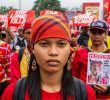INDEPENDENT COMMISSION TO ADDRESS MEDIA AND ACTIVIST KILLINGS
Created under Administrative Order No. 157 (s. 2006)
– 0 �
R E P O R T
– 0 –
INTRODUCTION
There is no shirking the fact that people, almost all of them activists or militants, have been killed. There is no denying the reality that militant citizens have been liquidated. The numbers vary. Task Force Usig of the Philippine National Police listed down one hundred eleven (111) killings, which has since increased to one hundred thirty six (136). Amnesty International, in its official website, mentions 244 victims. The group Karapatan is said to have counted at least 724 killings. Unfortunately, none of the so-called activist/militant groups, be they outright communist or satellite groups, came forward if only to inform the Commission of the numbers of their members who have become victims of extrajudicial killings. Be this as it may, the number, whether at a low of 111 according to Task Force Usig, or a high of 724 of Karapatan, is one too many.
It is said by those who would justify these killings that the victims are enemies of the State. Verily, one�s attention may be called to the screams in death of the victims of the Communist Party of the Philippines, its armed group the New People�s Army (�NPA�), and its front organizations. Surely, ever present is the only too human feeling of wanting to see one�s enemies and oppressors bite the dust, so to speak, struck down on the quick based on one�s own personal concept of justice or on the military�s unilateral assessment that they are enemies of the State.
This may well be so, but it should be carefully noted that the victims, of which this Commission is concerned, were all non-combatants. They were not killed in armed clashes or engagements with the military. They were killed, it is said, by motorcycle-riding hooded killers in assassination manner.
Government agencies hardly need reminding that in a democratic and civilized state such as ours, one must uphold and observe the rule of law, the principles of justice, and the system and rules of how it is dispensed � from investigation to arrest, to inquest, and to trial. The system may be far from perfect, giving rise to the temptation to take short-cuts. But precisely, short-cuts are in defiance of the system of impartial justice. The rules must be observed at all times.
This is the very reason why President Gloria Macapagal-Arroyo, understandably alarmed by these killings, created this Commission to get to the bottom of why these extrajudicial or extralegal killings are happening and who probably are responsible therefor.
It is regrettable that the militant groups which should be most interested in seeing justice done, forthwith tagged the Commission as not independent in composition. They refused to heed invitations of the Commission to appear�not necessarily with witnesses to the killing, for they may have none (or if there were witnesses, we could not in conscience force them to testify if they were fearful of their safety), but if only to inform the Commission of their own body-count of victims as well as to give their reasons why they believe that the military is responsible for the killings.
Nevertheless, this Commission gathered what information it could find from different sources. It became apparent early on that the number of killings, whether according to Karapatan or Task Force Usig, is one too many.
Extrajudicial Killings, Melo Commission Report on Extrajudicial Killings









